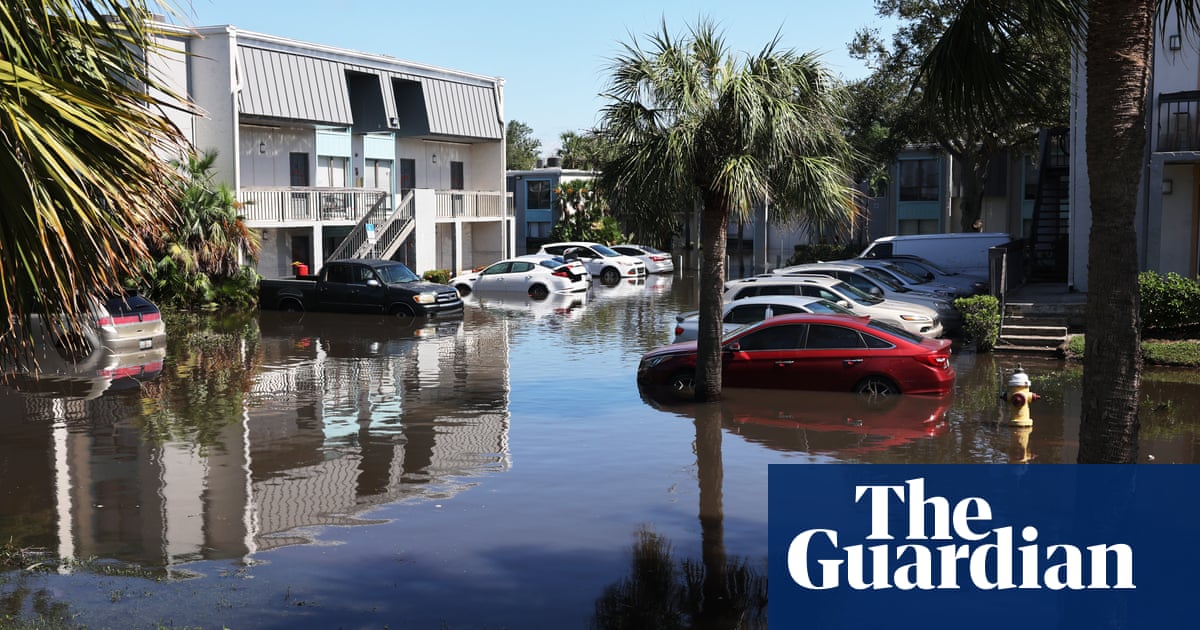Flooding is separate from typical US home insurance and many homeowners are not adequately covered
As millions of US residents begin working to file insurance claims on their homes in the aftermath of Hurricanes Helene and Milton, many could be denied, particularly if their homes were damaged by flooding.
A quirk in the US home insurance market is that flood insurance is separate from typical home insurance, which usually covers wind damage from hurricanes but not flooding. Homeowners must purchase flood insurance separately if they want their homes protected against flooding.
And many don’t. In some areas where Hurricane Helene hit the hardest, less than 1% of homes had flood insurance when the storm hit. In Buncombe county in North Carolina, home to Asheville, only 0.9% of homes had flood insurance, according to data from the Insurance Information Institute.
The number of people with flood insurance in Florida, which was hit by Hurricane Milton two weeks after parts of the state were battered by Helene, is higher than in other parts of the country. But still, the take-up is low. In Sarasota county, which took a direct hit from Milton, just 23% of residents have flood insurance.



From your previous post, your answer to your question is: You don’t move them. Instead you skyrocket the rates of insurance on the rest of the nation so that people can continuously have their houses in high risk area destroyed and rebuilt while the rest of the country pays for it. This is what an “ACA for home insurance” would do.
A more realistic approach would be to change the building codes to accommodate specific natural disasters for that geography. You want to build a house in the woods? Now you need a significant fire break around the house and need to build the house out of fire resistant materials if you want coverage. This is discussion of building regulation changes is already occurring. Same thing for houses in hurricane areas. If you want to build there, you have to build houses that will survive there and not be destroyed by the inevitable conditions.
None of this large transition is completed overnight, but it has to start happening now. What we have now is unsustainable.
Whoa whoa whoa, building codes? That’s just costly red tape! How will builders see ever increasing profit margins with all this government bureaucracy?! Remove the building codes entirely, let the Free MarketTM do an invisible handshake with Jesus, and the rest will take care of itself /s
New houses are required to be built to code for hurricane force wind here, the “post-Andrew” building code is good. Most of us don’t have new houses though, my house is from the 1940s, and the one I moved from is 100 years old this year.
We do have building code, what we don’t have is anyone willing to say no to developers. Sprawl, less land to absorb water. I see houses being built on seasonal wetlands, they fill them and raise 'em then the rest of the neighborhood floods in the rainy season. Nobody should be able to do that.
Restricting freedoms too?! You must be one uhv them commi an-tee-fah immigrants takin’ up all our jobs and unemployment benefits! Stay away from our cats! … unless they belong to childless women, then it’s fair game! /S
I think housing like this might be a smarter move than trying to move millions of people (or leaving them homeless).
First, I like those homes, but there’s a HUGE problem with your proposal.
From your linked article:
"But these features come at a cost. According to the community’s website, the homes are selling for $1.4 million to $1.9 million, compared to other new homes in the area priced for at least $600,000. "
Who are you suggesting pays for each person currently in FL to get a $1.4 million to $1.9 million home?
Well I would assume some of that comes from the lower volume of building the homes, with less people in construction in the area possessing the skills/materials to do so. Perhaps if the government put money towards volume buying materials and securing contractors able to build them, the price could come down to “market” values. I would think insurance companies would also see it as a win not having to payout as much for those that can actually be insured (and maybe makes it so more people can actually be covered making the graph go up).
I could be way off and the pricing of those homes are just unable to come down to an acceptable $ value, but government/insurance money would be put to better use looking to build more future climate safe homes as close as possible to the above model instead of today’s standard.
You’re agreeing with 90% of my post you indicated you disagreed with.
Economies of scale for materials would reduce costs slightly, but my understanding is the biggest cost of home building is land first, then labor. Material cost is surprisingly lower on the list. Labor costs are only going up, not down, and in our home building example labor doesn’t get less expensive when you scale up.